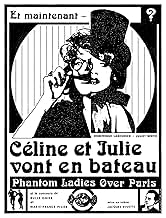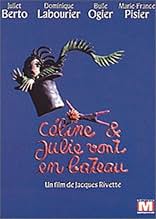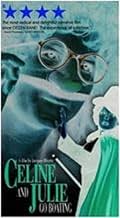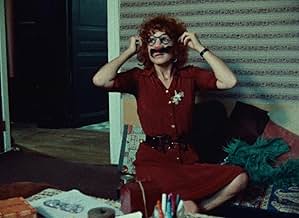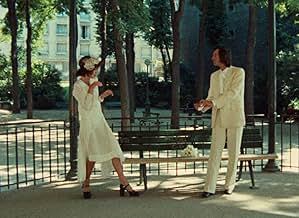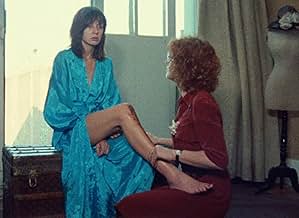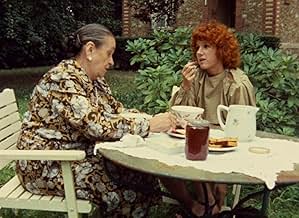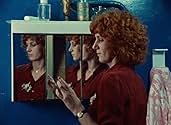Céline e Julie vanno in barca
Titolo originale: Céline et Julie vont en bateau : Phantom Ladies Over Paris
VALUTAZIONE IMDb
7,2/10
6775
LA TUA VALUTAZIONE
Una coppia di giovani donne misteriosamente legate trova la propria vita quotidiana ostacolata da uno strano melodramma da boudoir che si svolge in una realtà parallela allucinatoria.Una coppia di giovani donne misteriosamente legate trova la propria vita quotidiana ostacolata da uno strano melodramma da boudoir che si svolge in una realtà parallela allucinatoria.Una coppia di giovani donne misteriosamente legate trova la propria vita quotidiana ostacolata da uno strano melodramma da boudoir che si svolge in una realtà parallela allucinatoria.
- Regia
- Sceneggiatura
- Star
- Premi
- 1 vittoria in totale
Jean-Claude Biette
- Spectateur au cabaret
- (non citato nei titoli originali)
Jacques Bontemps
- Lecteur à la bibliothèque
- (non citato nei titoli originali)
Michel Caen
- Spectateur au cabaret
- (non citato nei titoli originali)
Recensioni in evidenza
10Corwin-3
Movies would seem to be the ideal medium for surrealism, yet there are almost no good surrealist movies. There is the venerable "Un Chien Andalou", and there is "Celine et Julie vont en Bateau", and that might well be the lot. "Celine et Julie" has been one of my favorite films since I first saw it in the 1970s, because it is hypnotic, thought-provoking, mysterious, and funny, all at once. Its overall style could be described as magical realism, in which the quotidian life of Paris serves as a mere background for the magical fantasy life of the protagonists, two young women on a psychic journey, which may or may not end in madness ("vont en bateau", which literally means "go boating", is also slang for "go crazy").
The film is made of moments that seem to happen outside of time. In fact, the passage of time, the succession of events in everyday life, becomes an intrusion on the increasingly shared inner life of the two women, and each takes (hilarious) action to prevent those intrusions from continuing. They determine, in effect, that they must return as adults to their childhood in order to change the past. This may sound like a boring Freudian nightmare, but there is no heavy-handed psychologizing in the movie; it is all play, lighthearted yet beautifully composed. The sound-track is particularly effective, almost hyperrealistic, with no background music. The click of heels on pavement, or the motor of a taxi, loom out of the silence as in a dream, which the movie may be, at its heart.
I give this one a 10. You probably know already whether you would like it. If so, see it in a theater if you can, and on video if you must, but don't miss it.
The film is made of moments that seem to happen outside of time. In fact, the passage of time, the succession of events in everyday life, becomes an intrusion on the increasingly shared inner life of the two women, and each takes (hilarious) action to prevent those intrusions from continuing. They determine, in effect, that they must return as adults to their childhood in order to change the past. This may sound like a boring Freudian nightmare, but there is no heavy-handed psychologizing in the movie; it is all play, lighthearted yet beautifully composed. The sound-track is particularly effective, almost hyperrealistic, with no background music. The click of heels on pavement, or the motor of a taxi, loom out of the silence as in a dream, which the movie may be, at its heart.
I give this one a 10. You probably know already whether you would like it. If so, see it in a theater if you can, and on video if you must, but don't miss it.
I recommend people read "Excruciating" (federovsky, 8/30/12) and "Much Ado About Nothing" (Milan, 4/15/2012) if they want to know what they are in store for. "Celine and Julie Go Boating" is difficult, frustrating and over long. However, it is also the kind of film that after seeing it, you wonder what other people have to say about it.
I didn't enjoy it much. Visually, it is not terribly special. The relationship between the two women and the "haunted house" is what keeps us watching, but the scenes come very slowly.
Several people have said it unfolds like a dream. Others have pointed out the lesbian/feminist side to it. Another possibility is that the two women represent two personalities of a schizophrenic nurse who committed an unspeakable crime. That would explain the repetitive cutting between one woman as the nurse and then her counterpart switching in. The two sides of the same madwoman angle possibly explains why the story includes the woman who is a performance amateur subbing for the experienced magician.
Between "Celine" (Juliet Berto) and "Julie" (Dominique Labourier), I think Labourier is the strongest here. Labourier has a lot of charisma; too bad Rivette has her often just laughing directly into the camera.
The characters in the "haunted house" are interesting. Marie-France Pisier is a favorite of mine, and she is very mysterious here.
If the scenes didn't unfold so sluggishly, and if the narrative were tighter, I think it would have been great. Unfortunately, it is too much work to recommend.
I didn't enjoy it much. Visually, it is not terribly special. The relationship between the two women and the "haunted house" is what keeps us watching, but the scenes come very slowly.
Several people have said it unfolds like a dream. Others have pointed out the lesbian/feminist side to it. Another possibility is that the two women represent two personalities of a schizophrenic nurse who committed an unspeakable crime. That would explain the repetitive cutting between one woman as the nurse and then her counterpart switching in. The two sides of the same madwoman angle possibly explains why the story includes the woman who is a performance amateur subbing for the experienced magician.
Between "Celine" (Juliet Berto) and "Julie" (Dominique Labourier), I think Labourier is the strongest here. Labourier has a lot of charisma; too bad Rivette has her often just laughing directly into the camera.
The characters in the "haunted house" are interesting. Marie-France Pisier is a favorite of mine, and she is very mysterious here.
If the scenes didn't unfold so sluggishly, and if the narrative were tighter, I think it would have been great. Unfortunately, it is too much work to recommend.
Overlong and difficult to watch with the interesting themes and material stretched surprisingly thin
Julie is a quiet and quite shy librarian who is in the park reading her book when a sort of white rabbit runs by in a hurry dropping stuff as she goes. Julie follows the girl to return her glasses etc but loses her, only for the girl (Celine) to turn up at Julie's workplace and put their two lives together. Julie discovers that Celine has been visiting a mysterious house during the day but leaving without a memory of what happened to her in there, so she decides to visit it as well only for the same to happen to her. The pair try to remember what they have gone through and gradually piece together that the house is trapped in a ghostly loop of the day a young girl was killed.
This plot summary is perhaps a bit flattering to the film because it does suggest that this is a tight little mystery with an element of magic and the supernatural to it, however nothing could really be further from the truth. As others have said this film is not really so much about what it seems, but few reviewers here have been able to shed much light on what it is actually about, with the majority just gushing about what a wonderful experience it is. I do concede that watching the film is an experience because it is very different from a lot of stuff I have seen before, but that does not necessarily read that it is brilliant as a result. I know there are things here that I am missing and I'm sure I'm being a total philistine, but it does seem that some people (particularly those who can barely stretch their love of the film to longer than a few lines of text) seem to be falling over themselves to praise a French art film for being, well, French and arty.
It was difficult for me to get through, I'll be honest, because it is very long by anyone standards. The first hour seems to be mostly silent and very, very little happens. Later in the film we do get more into the mystery of the house but even this is stretched to the point where it is hard to really care. Rivette has directed with a nice hand, using edits and atmosphere to produce a sense of wonder where really there isn't one. It does seem like his way of letting his cast explore has helped produce some of this natural air of imagination but I did wish that someone had maybe suggested to him that he reign it in to some degree but I guess nobody did (although seeing some of his other work, maybe this is him in total control!). The overall theme of childhood and imagination within this Alice in Wonderland rip is OK to discuss and think about but it is nowhere near interesting or clever enough to justify the long running time given to it here.
The cast do well to improvise and both Berto and Labourier have bought into the material well, producing the imaginative wonder and lack of restraint that the material needed it never seems like they are questioning anything they are presented with, which is pretty important with all the crossing of identities etc. Outside of them though there really isn't anyone else as the "ghosts" are mostly quite stagy and unconvincing.
Overall then an interesting film on paper but a frantically difficult one in reality. I'm sure many viewers will fall for its meandering scenes and imaginative subtexts but for me personally I found myself "getting it" quite quickly but then still forced to watch the scenes as they drag on. Call me a philistine if you wish, but I didn't really see what all the fuss was about and didn't find the heart of the film to reach me as it appears to have done with other viewers. Have a go by all means but please see it for yourselves and don't let the critical hype tell you what you "should" see.
This plot summary is perhaps a bit flattering to the film because it does suggest that this is a tight little mystery with an element of magic and the supernatural to it, however nothing could really be further from the truth. As others have said this film is not really so much about what it seems, but few reviewers here have been able to shed much light on what it is actually about, with the majority just gushing about what a wonderful experience it is. I do concede that watching the film is an experience because it is very different from a lot of stuff I have seen before, but that does not necessarily read that it is brilliant as a result. I know there are things here that I am missing and I'm sure I'm being a total philistine, but it does seem that some people (particularly those who can barely stretch their love of the film to longer than a few lines of text) seem to be falling over themselves to praise a French art film for being, well, French and arty.
It was difficult for me to get through, I'll be honest, because it is very long by anyone standards. The first hour seems to be mostly silent and very, very little happens. Later in the film we do get more into the mystery of the house but even this is stretched to the point where it is hard to really care. Rivette has directed with a nice hand, using edits and atmosphere to produce a sense of wonder where really there isn't one. It does seem like his way of letting his cast explore has helped produce some of this natural air of imagination but I did wish that someone had maybe suggested to him that he reign it in to some degree but I guess nobody did (although seeing some of his other work, maybe this is him in total control!). The overall theme of childhood and imagination within this Alice in Wonderland rip is OK to discuss and think about but it is nowhere near interesting or clever enough to justify the long running time given to it here.
The cast do well to improvise and both Berto and Labourier have bought into the material well, producing the imaginative wonder and lack of restraint that the material needed it never seems like they are questioning anything they are presented with, which is pretty important with all the crossing of identities etc. Outside of them though there really isn't anyone else as the "ghosts" are mostly quite stagy and unconvincing.
Overall then an interesting film on paper but a frantically difficult one in reality. I'm sure many viewers will fall for its meandering scenes and imaginative subtexts but for me personally I found myself "getting it" quite quickly but then still forced to watch the scenes as they drag on. Call me a philistine if you wish, but I didn't really see what all the fuss was about and didn't find the heart of the film to reach me as it appears to have done with other viewers. Have a go by all means but please see it for yourselves and don't let the critical hype tell you what you "should" see.
Praised by the critics as "delicate , mysterious, and exiting", "an original and entertaining metaphor for film-watching and, perhaps, film history", and named "The most radical and delightful narrative film since Citizen Kane! The experience of a lifetime" by New York's critic David Thompson, "Celine and Julie Go Boating" (1974) is all of the above but first of all it is incredible fun to watch. This magic candy of a movie tells the story (or rather plays with the story) of two friends, Julie, a librarian and Celine, a magician. The film starts one sunny summer day in Paris when Julie follows running through the park and losing her stuff all over (a scarf, a shoe
) Celine exactly like another girl in the English country side one sunny summer day had followed a White Rabbit into a world of her imagination. Two girls became friends and soon with the help of a magic memory-inducing candy, they both will be the observers and participants in a bizarre soap-opera like drama that takes place in a mysterious house. It involves two stunningly beautiful women, a blonde and a brunette, who are in love with the same man. The man is a widower with a young daughter who had promised his wife that he would not remarry as long as their daughter is alive. When the blonde and the brunette become desperate enough to try to do something about the situation, it is up to Julie and Celine to come up with the plan and to rescue the young girl. Will they go boating? Well, you will have to stay with them for all 193 minutes to find out. Yes, Rivette takes his time but his movie never seems slow or boring. Playful yet complicated, mad and funny, "Celine and Julie" is a magic movie. It grabbed me from the opening scene - which is of course the opening chapter of "Alice in Wonderland" - and it never let go. Buniel would love this movie, I think. It also reminds me of "Mullholand Dr" and even "Persona" but in the absolutely different mode. Simply DELIGHTFUL.
A PERFECT, SHARED IMAGINATION: something we become entirely incapable of evoking in our adult lives. As children, it's still possible to create an all-engrossing, parallel existence played out in symbiotic harmony by two individuals calling themselves best friends. With an uncluttered and unfettered creativity, these friends are sucked into their inner story to a point that time, place and the mundane habits and duties of one's routine no longer exist, or rather, are incorporated and/or adapted to fit what then becomes one's main existence - the imagined one. What makes this movie so convincingly evoke the yearning for the magic of childhood is exactly this: the fact that this imaginative world is shared so perfectly by two friends, and not just cultivated within an isolation and individuality typical of adult age. No other movie has made me think back at my childhood best friends as vividly as Céline and Julie Go Boating!
Hours spent in a room surrounded by familiar objects turned into so many powerful talismans. Earnest "magic" rituals punctuated by benevolent, mutual derision in the little moments in which one risks getting too serious or devoid of irony. Convulsive giggling fits which end in snorting noises. Relaxed, spontaneous, touchy-feely languid poses making two friends feel like they fit each other's company like a glove. Living the present so perfectly that one is momentarily, blissfully freed of any baggage from the past or the insecurities for the future that stunt one's spontaneity in the present. This isn't just a definition of perfect, child-like friendship, but also of a simple, uncluttered state of pure happiness. Rivette captures the spirit of all these things - childhood and happiness - in a movie unlike any I've seen before. Or rather - the movie may have seemed familiar thematically, but the execution and spirit of it was something else altogether.
As other users have commented here, Céline and Julie Go Boating is inspired by both Alice's Adventures in Wonderland and Henry James, as well as being reminiscent of Buñuel - not just his "surreal" movies but also That Obscure Object of Desire. In the latter, Carole Bouquet and Angela Molina play the same character interchangeably. Céline and Julie do the same when they both, interchangeably play the nurse in the closed-circuit, story-in-the-story involving the man, the blonde woman, the brunette woman and the little girl in the "haunted" house - this story's plot is being played out over and over again in the two protagonists' heads as they strive to both figure its intrigue and the dark heart of its mystery out, all the while deriding the stuffy rhetoric of its melodrama (delightful!). There are clear echoes of Bergman's Persona as well, as Céline and Julie stand in for each other - namely, Céline pretends to be Julie when she meets her childhood sweetheart and cousin Guilou, while Julie stands in for Céline when she attends the magician's audition. Touches of Buñuel and Fellini are also evoked by the dream sequences, with their typical, fragmented rhythm which mixes in dreams, reality, thoughts and imagination. Though innovative and timeless, Céline and Julie Go Boating does also belong to the decade in which it was made, as it has a recognisable 1960s/70s surrealist aesthetic and an interest in "inner landscapes", not for their own sake but for what they say about the psychic goings on of human beings.
Purely thematically, this movie also brought to mind Peter Jackson's 1994 movie Heavenly Creatures. However, though the latter was made exactly 20 years later than Céline and Julie, it is decidedly more "misogynistic" in spirit, to be fair perhaps not consciously or intentionally so. Why am I calling Jackson's movie misogynistic? Because ultimately, unlike Céline and Julie Go Boating, it treats the symbiotic, shared, female imagination that's allowed free rein as something negatively irrational, uncontrollable, dark and finally, destructive, the lesbian undertones becoming morbid rather than light-hearted, humorous and feel-good as in the Rivette's splendid and highly original movie.
What this Céline and Julie Go Boating told me was that in some cases, guiltlessly cultivating, salvaging and exploring one's inner and imaginative life is far more important than meeting the expectations of one's day-to-day, material duties. Therefore, solving the mystery of a "haunted" house is more crucial than, say, furthering one's career (for example, succeeding in an audition for an important, international magician's tour - Céline should have attended it but Julie does so instead, to very amusing and disastrous effect! I loved, loved, loved actress Dominique Labourier's droll histrionics during that scene!).
I have never seen a movie treat with such humour and gaiety a subject as serious, complex and potentially heavy-duty Freudian as exploring one's unresolved childhood issues. Much of this movie is about Julie's (and perhaps everyone's, to a degree) inability to assimilate the past completely (her tarot reading by a fellow librarian reveals this at the beginning of the movie - "Your future is in the past"). To put it stereotypically, the "inner child" needs to be freed before one can truly become an adult - a happy, healthy, sorted, serene, childlike adult. This process of healing is punctuated by the two protagonists by playful role-playing (both Céline and Julie have a ball taking on different identities by also donning different costumes throughout the course of the movie), an endless string of occasions for giggling fits and what is essentially a cheerful use of childish "drugs" (candy and home-made magic potions) to evoke that crucial, life-giving shared imagination. In a sentence, the psychic ailments typical of adulthood are cured with the spirit typical of childhood.
Hours spent in a room surrounded by familiar objects turned into so many powerful talismans. Earnest "magic" rituals punctuated by benevolent, mutual derision in the little moments in which one risks getting too serious or devoid of irony. Convulsive giggling fits which end in snorting noises. Relaxed, spontaneous, touchy-feely languid poses making two friends feel like they fit each other's company like a glove. Living the present so perfectly that one is momentarily, blissfully freed of any baggage from the past or the insecurities for the future that stunt one's spontaneity in the present. This isn't just a definition of perfect, child-like friendship, but also of a simple, uncluttered state of pure happiness. Rivette captures the spirit of all these things - childhood and happiness - in a movie unlike any I've seen before. Or rather - the movie may have seemed familiar thematically, but the execution and spirit of it was something else altogether.
As other users have commented here, Céline and Julie Go Boating is inspired by both Alice's Adventures in Wonderland and Henry James, as well as being reminiscent of Buñuel - not just his "surreal" movies but also That Obscure Object of Desire. In the latter, Carole Bouquet and Angela Molina play the same character interchangeably. Céline and Julie do the same when they both, interchangeably play the nurse in the closed-circuit, story-in-the-story involving the man, the blonde woman, the brunette woman and the little girl in the "haunted" house - this story's plot is being played out over and over again in the two protagonists' heads as they strive to both figure its intrigue and the dark heart of its mystery out, all the while deriding the stuffy rhetoric of its melodrama (delightful!). There are clear echoes of Bergman's Persona as well, as Céline and Julie stand in for each other - namely, Céline pretends to be Julie when she meets her childhood sweetheart and cousin Guilou, while Julie stands in for Céline when she attends the magician's audition. Touches of Buñuel and Fellini are also evoked by the dream sequences, with their typical, fragmented rhythm which mixes in dreams, reality, thoughts and imagination. Though innovative and timeless, Céline and Julie Go Boating does also belong to the decade in which it was made, as it has a recognisable 1960s/70s surrealist aesthetic and an interest in "inner landscapes", not for their own sake but for what they say about the psychic goings on of human beings.
Purely thematically, this movie also brought to mind Peter Jackson's 1994 movie Heavenly Creatures. However, though the latter was made exactly 20 years later than Céline and Julie, it is decidedly more "misogynistic" in spirit, to be fair perhaps not consciously or intentionally so. Why am I calling Jackson's movie misogynistic? Because ultimately, unlike Céline and Julie Go Boating, it treats the symbiotic, shared, female imagination that's allowed free rein as something negatively irrational, uncontrollable, dark and finally, destructive, the lesbian undertones becoming morbid rather than light-hearted, humorous and feel-good as in the Rivette's splendid and highly original movie.
What this Céline and Julie Go Boating told me was that in some cases, guiltlessly cultivating, salvaging and exploring one's inner and imaginative life is far more important than meeting the expectations of one's day-to-day, material duties. Therefore, solving the mystery of a "haunted" house is more crucial than, say, furthering one's career (for example, succeeding in an audition for an important, international magician's tour - Céline should have attended it but Julie does so instead, to very amusing and disastrous effect! I loved, loved, loved actress Dominique Labourier's droll histrionics during that scene!).
I have never seen a movie treat with such humour and gaiety a subject as serious, complex and potentially heavy-duty Freudian as exploring one's unresolved childhood issues. Much of this movie is about Julie's (and perhaps everyone's, to a degree) inability to assimilate the past completely (her tarot reading by a fellow librarian reveals this at the beginning of the movie - "Your future is in the past"). To put it stereotypically, the "inner child" needs to be freed before one can truly become an adult - a happy, healthy, sorted, serene, childlike adult. This process of healing is punctuated by the two protagonists by playful role-playing (both Céline and Julie have a ball taking on different identities by also donning different costumes throughout the course of the movie), an endless string of occasions for giggling fits and what is essentially a cheerful use of childish "drugs" (candy and home-made magic potions) to evoke that crucial, life-giving shared imagination. In a sentence, the psychic ailments typical of adulthood are cured with the spirit typical of childhood.
Lo sapevi?
- QuizIt is a misconception that most of the film was improvised by the actors. Jacques Rivette provided structure but did not let his actors "go wild", instead he let them write. A single scene was improvised, where Celine, played by Julie Berto, brags to her associates about her rich American friend. The rest of the scenes where shot from scripted material, mostly thanks to participating actors. The film is collaboration by several authors, including actors Berto, Labourier, Ogier and Pisier. Rivette's involvement in the writing was to give structure to all the contributions, tightening things up.
- BlooperThe last time Julie receives the cigarette from under the table, it is bigger than it was when her colleague handed it to her.
- ConnessioniFeatured in Berlin Chamissoplatz (1980)
I più visti
Accedi per valutare e creare un elenco di titoli salvati per ottenere consigli personalizzati
- How long is Celine and Julie Go Boating?Powered by Alexa
Dettagli
Botteghino
- Lordo Stati Uniti e Canada
- 31.452 USD
- Fine settimana di apertura Stati Uniti e Canada
- 5624 USD
- 6 mag 2012
- Lordo in tutto il mondo
- 31.452 USD
- Tempo di esecuzione3 ore 13 minuti
- Mix di suoni
- Proporzioni
- 1.37 : 1
Contribuisci a questa pagina
Suggerisci una modifica o aggiungi i contenuti mancanti

Divario superiore
By what name was Céline e Julie vanno in barca (1974) officially released in India in English?
Rispondi

